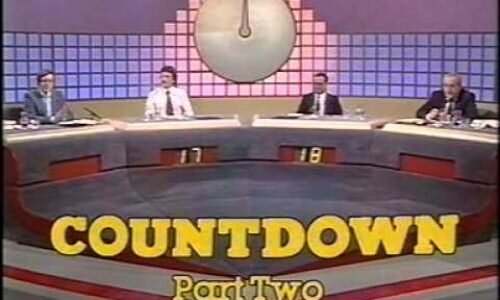
A brand new Countdown begins
It was at 4.45pm on 2nd November 1982 that Channel 4 started broadcasting. I remember as I made sure I was back from school and playing with friends to see a moment of history. I was already a TV nerd then, writes Kevin Johnson.
I was in front of the telly as the UK’s fourth channel began and as Richard Whiteley uttered those immortal words:
As the countdown to a brand new channel ends,
a brand new Countdown begins.
So, it seems fitting that I publish this post at the same time on the clock during a day when Mayor Andy Street and his team are intensifying efforts to persuade Channel 4 bosses they should re-locate to the West Midlands.
The clock has started on the final push. Another countdown is on.
I spent much of my career in television. Much of it was what one boss described as managing decline.
The consequences of mullti-channel television, technological advances, the ending of restrictive practices, the loosening of regulation, changes in viewers’ tastes, a shift from studio to location based production aided by lighter equipment and then the digital revolution were just some of the factors which changed the broadcast industry.
Two announcements effectively bookended my career at ITV Central. In the early 1990’s, I was a very junior member of the PR team that managed the internal, media, investor and government aspects of the announcement of around 500 redundancies ahead of licence renewal.
I swept into Central House as part of a team from a semi-external agency to manage the ‘event’. I remember seeing the faces of people who had spent their lives in the industry reading notices on the boards as I departed and as they contemplated the end of their brilliant careers.
Then, in my final months with the broadcaster, I was part of the management team that developed a plan for what would be required in terms of regional infrastructure and staffing as the big ITV fiims, Granada and Carlton, prepared to ‘merge’ into a single ITV company.
The result was another round of redundancies, re-organisations and the closure of the Nottingham Studios.
Many of the changes that took place over 10 years or more were necessary. They were a response to almost revolutionary changes in the technological, consumer and legislative environment.
But, many of us would suggest it has gone too far. The race for efficiency has seen a cost in terms of serving audiences and putting too much distance between viewer, producer and commissioner.
We are still struggling to find the right models for local media.
Diversity of programme ideas, production and commissioning also suffers if the major clusters of programme makers and other creative functions only settle in one or two places.
Any effective re-balancing of society needs to see a less centralised state. The UK is centralised to a degree unlike anywhere else in the world, save Albania and New Zealand.
To a large degree, the concentration of the media industry in London is inevitable. Indeed, it would be folly to even attempt to move the Channel 4’s media sales and some other commercial functions from London.
During my years at ITV, I lost count of the number of times I had to explain why we didn’t need big and expensive TV studios any more.
The over supply of studio capacity, technological and industrial changes and, most notably, programme formats had changed considerably. It was never an argument that certain newspaper editors or business lobby groups wanted to hear!
Now, the TV industry is unrecognisable. Who would have imagined then the rise of Netflix and Amazon, let alone where Sky, the BBC and BT would now be.
So, if and when Channel 4 does move to the West Midlands it will not see a return to the days of massive studio production in Birmingham. The stars of Crossroads, Pebble Mill at One, Boon, and Bullseye will not be popping into Selfridges every lunchtime.
The people who work in Channel 4 HQ will go by unnoticed to the man and woman in the street.
But, over time, a move for the channel to Birmingham will give the broadcaster a different perspective and ready access to fresh talent and ideas.
Channel 4 was always about innovation and alternative approaches. It was meant to mix the best of public service and commercial success.
That thread of innovation and experimentation has not been as evident in recent years. The challenge for any content provider, especially one with a public service ethos up against the big beasts for public attention and commercial investment, is so much greater than in 1982.
A move to the West Midlands could just provide a new impetus.
A brand new countdown begins.
Similar Articles
Council: Panel stands down, but recommends another one pop up
The Panel set up to oversee improvements to Birmingham city council has disbanded itself and
Brexit Watch: The List
We are living though extraordinary political times. The only thing to do in such circumstances
Birmingham City Council – a beacon (yes, you read that correctly)
They’re a tricky business, industrial relations, and I normally steer well clear. However, when the
Region needs more jobs, higher skills and better housing – report
A new report into economic injustice in Birmingham and the Black Country paints a stark
The ins, outs and whereabouts of fly-tipping
On the day Birmingham's latest bin strike starts up, Chris Game throws a political dead










